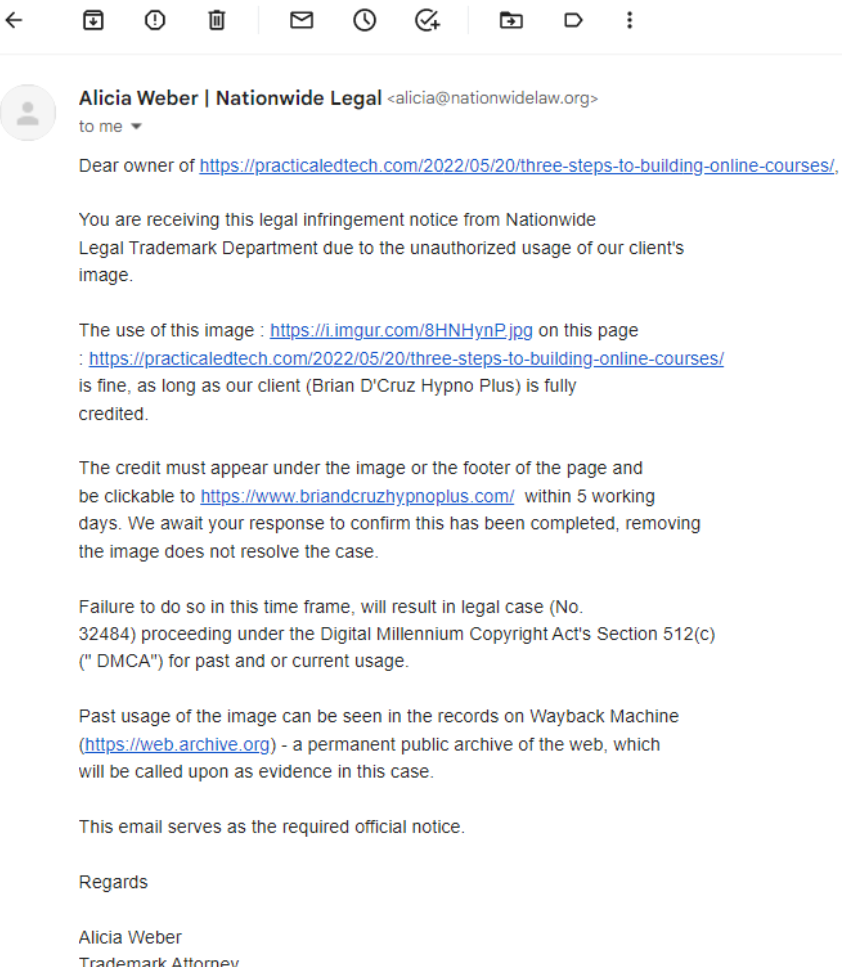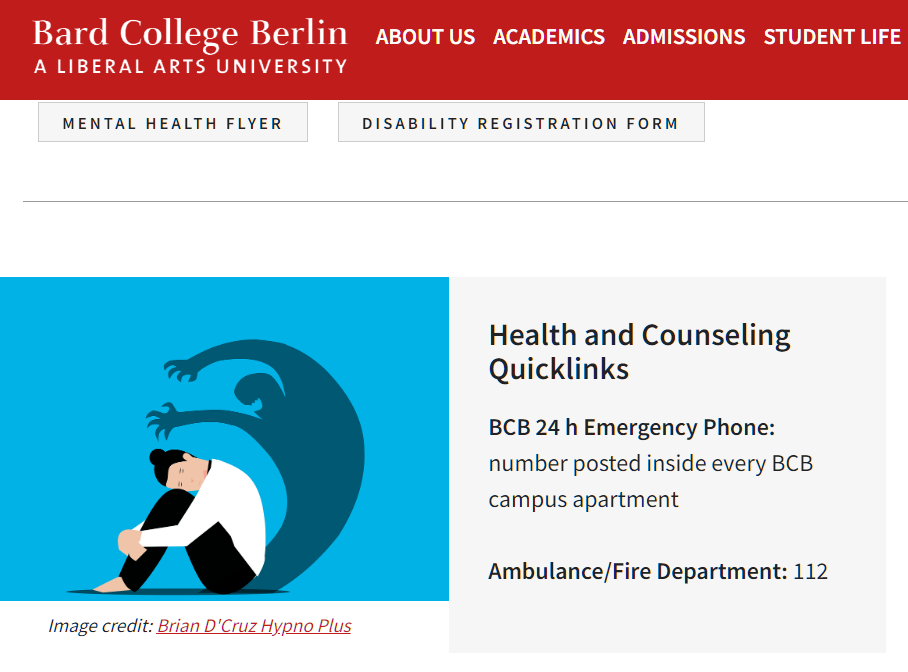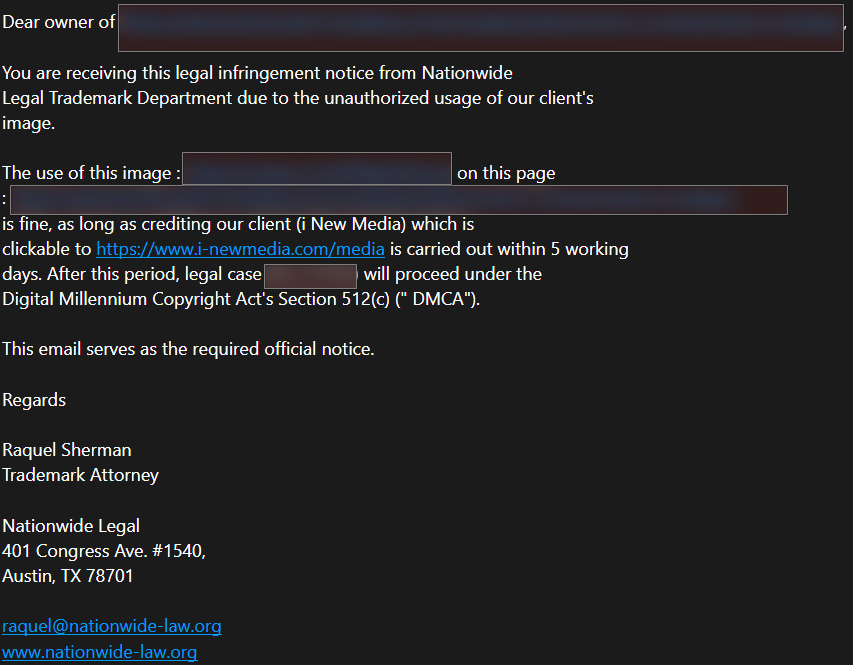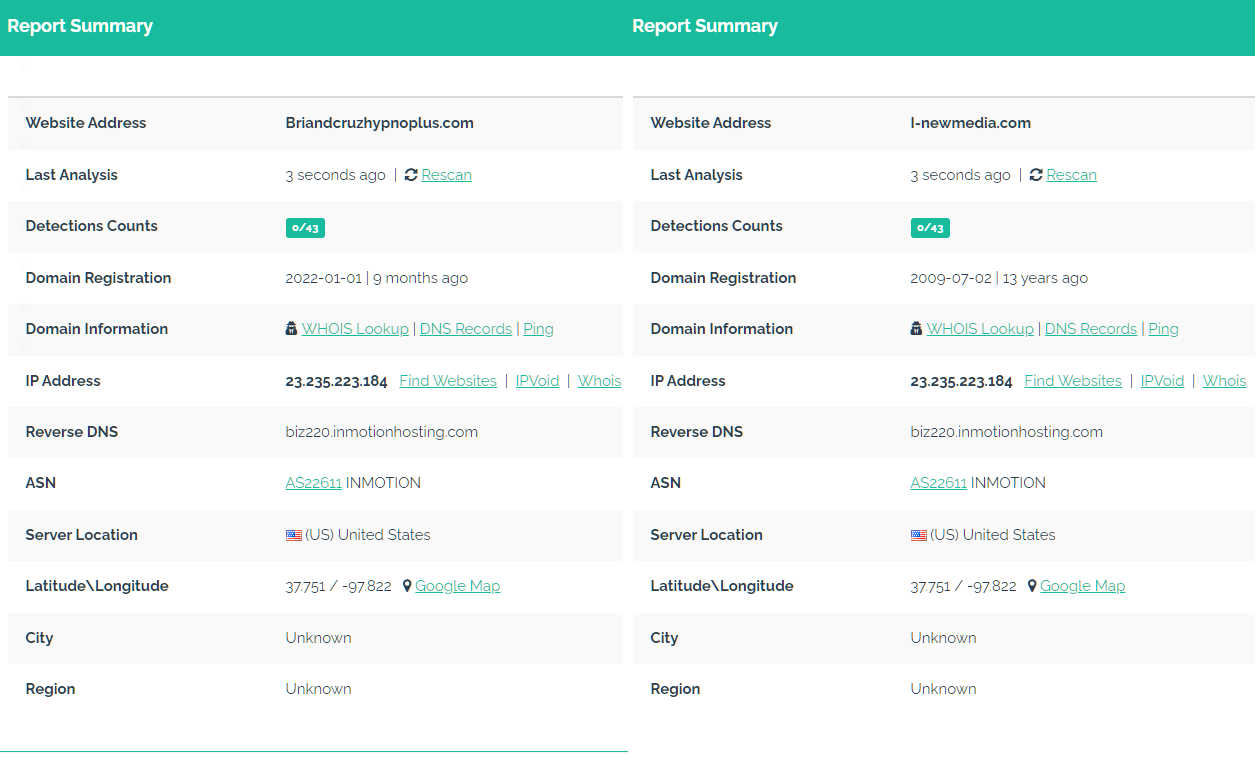
For website operators trying to put information in the public eye, the last thing they need are legal threats alleging they have infringed on someone’s copyright.
Copyright lawsuits have a reputation for being expensive to defend, so when threatened, most people take the easy way out. A new wave of copyright complaints being filed right now offers an extremely easy way out for alleged infringers. That’s because the scammers behind them want people to take this route.
alleged infringement of “Copyrighted Images”
March 2022 Richard Byrne of freetech4teachers.com discovered a scam in which website operators were informed by the alleged law firm Arthur Davidson Legal that they had infringed the copyright of an image and that a lawsuit might follow. However, if the recipient simply linked to a domain and posted a credit on their site, the matter would be closed.
A similar scam was optimistically targeted at TorrentFreak last year, but a couple of articles in response are unlikely to stop these schemes from spreading and claiming even more victims.
In a new article this week, Richard Byrne reports an email sent to him by another bogus law firm, this time calling itself “Nationwide Legal.” [nationwidelaw[D0T]org]. The email doesn’t mention Byrne by name (a red flag in itself), but it tries to accomplish the same goals: link to a site, credit the “source,” and Byrne won’t be sued for copyright infringement.

The image referenced in the email as the original, copyrighted image is suspiciously hosted on Imgur. It took us less than 20 seconds to find that the image is offered on Pixabay and is marked “Free for Commercial Use” and “No Attribution Required”.
There is no copyright infringement and the scammers know it.
The targets of the scam
These scams only have one initial goal in mind: to have as many domains as possible link to a specific domain in order to increase its perceived value in the eyes of search engines. This time, scammers are trying to drive traffic [briandcruzhypnoplus[D0T]com], which claims to represent the business of a UK-based hypnotherapist named Brian D’Cruz.
As the screenshot below shows, reputable third-party sites are already falling for this fake credit and link scam.

The [briandcruzhypnoplus[D0T]com]that people are pressured to credit and link to was registered on January 1, 2022 and allegedly includes commercial information related to Brian D’Cruz and his hypnotherapy practice.
It will come as no surprise that there is nothing simple about the website or the person it claims to represent. But before we dive down the rabbit hole, let’s take a look at who this campaign was aimed at.
Victim sites are mostly related to mental health issues
One of the metrics that search engines use to determine the value of external links pointing to a domain is whether the content of the linking sites (those that have received a false DMCA notice) is relevant to the content of the destination site , in this case the fake hypnotherapy site.
Based on the information available, it appears that scammers are primarily targeting sites that cover mental illness and medical illnesses that affect the mind, such as dementia and Alzheimer’s. Since they all now contain links to the hypnotherapy scam site, they are not hard to find.
Some of the targeted sites are listed below. The article title appears first with a link to the source page, which at the time of writing includes credits and links to the fake hypnotherapy site.
Informed Pedagogy in Trauma – Barnard College / Columbia University
Health and Counseling Services – Bard College in Berlin
Occupational Therapists and Interventions in Mental Health – Move with HOPE
Grieving: Nursing students’ struggle with the loss of a father – Pain healing block
Exhaustion and overflow – Buddhistdoor Global
New Ai-based algorithm to detect cerebral hemorrhage – No Camels
Mental health during crises like Covid 19 – Safe communities Portugal
“Effective treatment” for Alzheimer’s – EyesOnALZ
We can do better – Association of Chronic Mental Ills
What is a mental health crisis? – Jonathan’s Voice (UK-based mental health charity)
The above list is not very comprehensive and seems to be growing over time.
DMCA scam deceives by abusing real information
Identifying who is behind these scams is never easy, but with the right tools and patience, it is entirely possible to shed light on the mechanisms. With that in mind, it’s worth briefly calling attention to Brian D’Cruz, who has been thrust into the spotlight (like it or not) thanks to this campaign. It turns out that Mr. D’Cruz, whoever he is, is a useful conduit for additional information.
From everything we’ve seen so far, Brian D’Cruz exists. As the bogus website clearly states, he practices hypnotherapy in the south of England, or did at one point. However, if Brian D’Cruz’s name is crossed with the General Hypnotherapy Registry listings, the scammer’s website is not what appears.
In fact, the listed links D’Cruz to BeyondBoundariesHypnotherapy.com, an apparently dead site that carries much of the same information as the new one posted in January. A copy of the Wayback Machine also reveals that the therapist’s photographs are drastically different if compared between sites, an indication of deliberate change.
Ghosts of the past
Since the email address available for Brian D’Cruz is linked to the now-defunct domain ‘Beyond Boundaries’, he could not be contacted. However, we were able to establish that the original “Beyond Limits” domain was created several years ago and registered to a Sam D’Cruz.
Like the archive copy of the Beyond Boundaries website on the Wayback Machine clearly shows in the footer, the site was created by a web design/SEO company and New Media. Sam is currently registered to his “friends” page. and seems to have a strong connection to the company.
At the time of writing, we have yet to hear back from Sam following our requests for comment. We have also not received any response from I-New Media. It’s a real shame, considering how many questions we have.
I-New Media has also obtained image credits and backlinks
According to their website, And New media offers search engine optimization (SEO) services, as many companies do. However, we were surprised to learn that the company is also receiving backlinks from sites that appear to credit them with ownership of images they don’t own the rights to.
For example, there is this piece on the WeGrowValue.com website, where an image is credited to the company for no apparent reason. Next to it is a link to the URL i-newmedia.com/media.

This next example of a credit and link back to I-New Media provides more irony than anyone could have expected.
Lewis Silkin is a leading international law firm with undoubted skills in all areas of law, including copyright. In fact, Lewis Silkin worked in the UK to help identify suspected BitTorrent pirates so they could receive a letter in the mail from rights holders alleging copyright infringement. Of course, recipients could choose to resolve their cases by taking positive action, in this case paying a settlement.
In this case, Lewis Silkin appears to have received a lawsuit link back to I-New Media and under the threat of a copyright lawsuit, he decided to comply with the scammers.

Other sites that credit I-New Media for image content they do not own include:
What is social media marketing? – GetSocialGuide.com
Using social media can contribute to sleep deprivation – HealthTechInsider.com
A quick guide to tracking social media followers – Bad Rhino Inc.
There are many more cases of sites crediting and linking to I-New Media, but the missing link is why they chose to do so. Did they do it under duress or maybe they had a relationship with the company and did it willingly?
At this point it is worth referring to the email received by Richard Byrne of freetech4teachers.com. We mentioned this at the beginning of this article and it is the reason why we embarked on this mission. Nationwide Legal’s “trademark department” sent the email, mentioned the DMCA and warned that a copyright lawsuit could result if it was breached. So we started reaching out to people who linked to I-New Media to find out what prompted them to do so.
We received several responses and they all told the same story. An unsolicited email claiming copyright infringement on the images instructed them to credit I-New Media and link to a specific URL. In return, past and future “violations” would be ignored and there would be no lawsuits.

As mentioned above, we reached out to Sam D’Cruz and I-New Media for comment, but neither responded. This means we can’t get answers to some of these other questions either, which is disappointing under the circumstances.
A few coincidences to clarify
Since the scam hypnotherapist website was copied from a website that I-New Media originally designed, we wanted to set the record straight with the company. Is it one of those one in a million coincidences that happen every now and then, or is there another explanation?
Also, it is a coincidence that a person named Sam D’Cruz, who works for I-New Media, is not only registered as the domain registrant of the original hypnotherapy site, but also shares the same uncommon last name as the hypnotherapist? Stranger things have happened, but we wanted to clear that up, too.
So, given the links above, coincidental or not, what are the chances that the same scamming law firm is sending identical legal threats to drive traffic to the bogus hypnotherapy site, even though it appears to be doing exactly what same for I-New Media website? Or is I-New Media an unfortunate victim of all this?
These are questions that need to be answered, but as we said, our emails go unanswered. If they were, we would also ask for another match. It concerns the choice of hosting for the I-New Media website and the scam hypnotherapist website.

Apart from the domain names and ages, their WHOIS reports look exactly the same and although the IP address points to shared hosting used by a large number of other websites, there is an extraordinary number of ‘IP addresses available online where one site (or the other) could have been located instead.
Throwing the exact same DNS server for both domains on top of that IP address match seems mathematically extraordinary, but there’s no telling what will happen next.
TorrentFreak is told that at least one of the companies targeted with a fake DMCA notice is already consulting with its legal team, and we wouldn’t be surprised if others are also considering their options.
[ad_2]
Source link




